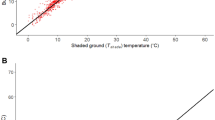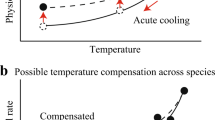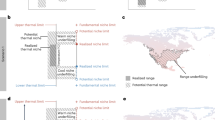Abstract
THERMAL acclimation has been studied most intensively in aquatic ectotherms1 in which body temperature closely approximates water temperature, which changes slowly with season. As aquatic ectotherms must therefore be active over a range of slowly changing body temperatures, acclimation usually functions as a homeostatic mechanism; following a temperature change in the environment, the organism's metabolic rate is adjusted so that it is returned to near its original level2. Some terrestrial animals, particularly reptiles which thermoregulate behaviourally, are subject to considerable daily fluctuations in body temperature3. This difference in the thermal ecology of aquatic ectotherms and terrestrial reptiles, which may cause a difference in the acclimatory responses of the two groups, has not been considered in the work on thermal acclimation in reptiles4–6. Consequently, this work is of little use in predicting the acclimatory responses of reptiles to seasonal temperature changes in the field. We present here evidence that lizards allowed to thermoregulate behaviourally acclimate only at low body temperatures and that the common pattern of acclimation differs from that of aquatic organisms in being determined by requirements of low temperature energy conservation rather than metabolic homeostasis.
This is a preview of subscription content, access via your institution
Access options
Subscribe to this journal
Receive 51 print issues and online access
$199.00 per year
only $3.90 per issue
Buy this article
- Purchase on Springer Link
- Instant access to full article PDF
Prices may be subject to local taxes which are calculated during checkout
Similar content being viewed by others
References
Hazel, J. R. & Prosser, C. L. Physiol. Rev. 54, 620–677 (1974).
Fry, F. E. J. & Hochachka, P. W. in Comparative Physiology of Thermoregulation, 1 (ed. Whittow, G. C.) 79–134 (Academic, New York, 1970).
Bennett, A. F. & Dawson, W. R. in Biology of the Reptilia 5 (eds Gans, C. & Dawson, W. R.) 127–223 (Academic, London, 1976).
Gelineo, S. & Gelineo, A. C.r. Séanc. Soc. Biol. 149, 387–389 (1955).
Murrish, D. E. & Vance, V. J. Comp. Biochem. Physiol. 27, 329–337 (1968).
Dutton, R. H. & Fitzpatrick, L. C. Comp. Biochem. Physiol. 51A, 309–318 (1975).
Patterson, J. W. & Davies, P. M. C. J. therm. Biol. 3, 39–41 (1978).
Templeton, J. R. in Comparative Physiology of Thermoregulation 1 (ed. Whittow, G. C.) 167–218 (Academic, New York, 1970).
Cloudsley-Thompson, J. L. The Temperature and Water Relations of Reptiles (Merrow, Watford, 1971).
Heath, J. E. Amer. Midl. Nat. 77, 64–76 (1967).
Heath, J. E. & Wilkin, P. J. Physiol. Zool. 43, 145–154 (1970).
Humphreys, W. F. Nature 251, 502–503 (1974).
Author information
Authors and Affiliations
Rights and permissions
About this article
Cite this article
PATTERSON, J., DAVIES, P. Thermal acclimation in temperate lizards. Nature 275, 646–647 (1978). https://doi.org/10.1038/275646a0
Received:
Accepted:
Issue Date:
DOI: https://doi.org/10.1038/275646a0
This article is cited by
-
Lizard thermal trait variation at multiple scales: a review
Journal of Comparative Physiology B (2014)
-
Benefits of thermal acclimation in a tropical aquatic ectotherm, the Arafura filesnake, Acrochordus arafurae
Journal of Comparative Physiology B (2012)
-
Morphology of the pancreas of some species belonging to the genera Phelsuma and Gecko (family Gekkonidae): evidence of apoptotic process during the seasonal cycle
Anatomy and Embryology (2006)
-
Individual and population energetics of a lizard on a Mediterranean islet
Oecologia (1992)
-
The influence of temperature, sexual condition, and season on the metabolic rate of the lizardPsammodromus hispanicus
Journal of Comparative Physiology B (1984)
Comments
By submitting a comment you agree to abide by our Terms and Community Guidelines. If you find something abusive or that does not comply with our terms or guidelines please flag it as inappropriate.



